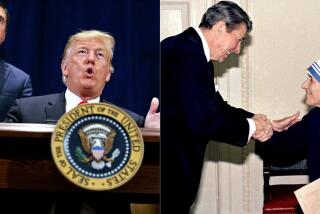Gorbachev Is ‘Different,’ Reagan Asserts
- Share via
JACKSONVILLE, Fla. — President Reagan took his public relations campaign for a U.S.-Soviet arms control agreement on the road Tuesday, telling a large group of high school seniors here that Soviet leader Mikhail S. Gorbachev “is different than past Soviet leaders.”
“No other Russian leader has ever agreed to eliminate weapons they already have,” Reagan said in response to a question from a student. “He is also the first Russian leader who has never reiterated before the great national Communist congress that the Soviets are pledged to world expansion--a one-world Communist state. That has been the stated goal of previous leaders. He has said no such thing.”
Reagan, while vowing to press Gorbachev, the general secretary of the Soviet Communist Party, on a number of contentious issues at next week’s summit meeting in Washington, generally struck a conciliatory note in his speech to the audience of about 8,500 students and parents.
And Reagan joked that he is not unduly worried about the wave of favorable publicity Gorbachev has generated for himself by his high-profile campaign for glasnost, or openness.
“I don’t resent his popularity or anything else,” Reagan said. “Good Lord, I co-starred with Errol Flynn once,” referring to the popular swashbuckling film star of the 1930s.
At the summit meeting, Reagan and Gorbachev are expected to sign an agreement calling for the elimination of each nation’s intermediate-range nuclear missiles.
But, unlike his remarks to the conservative Heritage Foundation in Washington on Monday, Reagan barely mentioned his dream of a space-based defense against nuclear missiles in his speech here.
Liked by Conservatives
The Strategic Defense Initiative, as the Administration calls the proposed space defense system, is popular with conservatives. But Reagan’s determination to press for future deployment of the system is seen as an obstacle to reaching a further accord with the Soviets to slash the number of long-range strategic weapons both nations have aimed at each other.
Conservatives have raised strong objections to the agreement on intermediate-range missiles, but the White House is counting on strong public support for nuclear arms cuts to assure ratification of the treaty in the Senate by the necessary two-thirds majority.
Reagan told his enthusiastic audience Tuesday that his goal is not just to eliminate intermediate-range missiles but to “keep right on marching” toward “cutting the U.S. and Soviet long-range nuclear arsenals in half and reducing the disparities in conventional forces--that is, the armies that face each other in Europe.”
But Reagan also sought to accommodate his conservative critics who contend that he has tempered his anti-communism in his quest for an historic arms control breakthrough with the Soviet Union. He harshly criticized the era of “warming in U.S.-Soviet affairs that we called detente,” which was initiated by former President Richard M. Nixon, because, he said, it failed to curb Soviet adventurism abroad and repression at home.
“We do not want mere words,” Reagan said. “This time we’re after true peace.” Gorbachev’s image as a younger, more dynamic man was clearly on Reagan’s mind less than a week before he will meet the Soviet leader for the third time. Reagan emphasized that he is ready to compete with Gorbachev on the world stage to sway public opinion in Europe and the United States.
The two leaders first met in Geneva in 1985 and then in Reykjavik, Iceland, last year.
Reagan again promised to press Gorbachev on human rights violations within the Soviet Union, as well as to demand that the Soviets end their occupation of Afghanistan and their military support for Nicaragua and other leftist regimes around the world.
More to Read
Sign up for Essential California
The most important California stories and recommendations in your inbox every morning.
You may occasionally receive promotional content from the Los Angeles Times.













